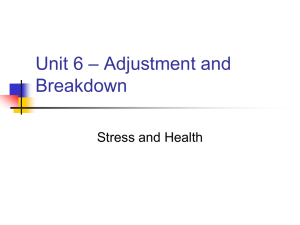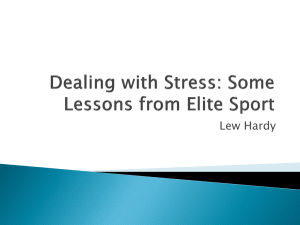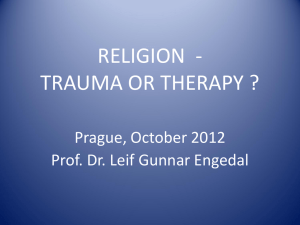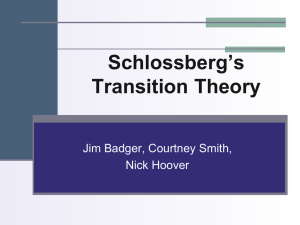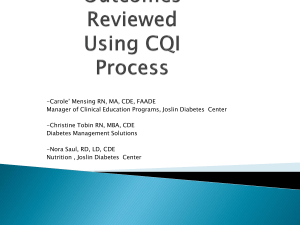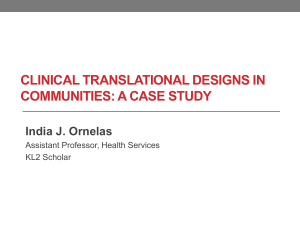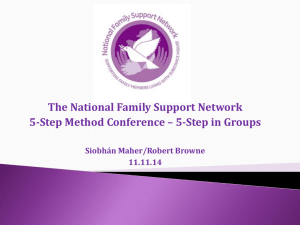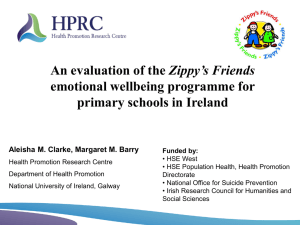Assessing the Role of Religion and Spirituality in Coping with Life
advertisement
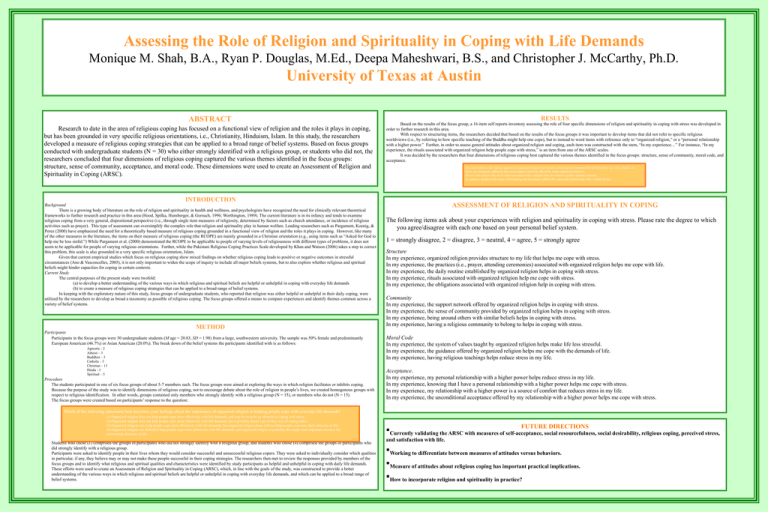
Assessing the Role of Religion and Spirituality in Coping with Life Demands Monique M. Shah, B.A., Ryan P. Douglas, M.Ed., Deepa Maheshwari, B.S., and Christopher J. McCarthy, Ph.D. University of Texas at Austin ABSTRACT Research to date in the area of religious coping has focused on a functional view of religion and the roles it plays in coping, but has been grounded in very specific religious orientations, i.e., Christianity, Hinduism, Islam. In this study, the researchers developed a measure of religious coping strategies that can be applied to a broad range of belief systems. Based on focus groups conducted with undergraduate students (N = 30) who either strongly identified with a religious group, or students who did not, the researchers concluded that four dimensions of religious coping captured the various themes identified in the focus groups: structure, sense of community, acceptance, and moral code. These dimensions were used to create an Assessment of Religion and Spirituality in Coping (ARSC). RESULTS Based on the results of the focus group, a 16-item self reports inventory assessing the role of four specific dimensions of religion and spirituality in coping with stress was developed in order to further research in this area. With respect to structuring items, the researchers decided that based on the results of the focus groups it was important to develop items that did not refer to specific religious worldviews (i.e., by referring to how specific teaching of the Buddha might help one cope), but to instead to word items with reference only to “organized religion,” or a “personal relationship with a higher power.” Further, in order to assess general attitudes about organized religion and coping, each item was constructed with the stem, “In my experience…” For instance, “In my experience, the rituals associated with organized religion help people cope with stress,” is an item from one of the ARSC scales. It was decided by the researchers that four dimensions of religious coping best captured the various themes identified in the focus groups: structure, sense of community, moral code, and acceptance. Structure refers to the various aspects of organized religion that create a structured environment for its followers, e.g. rules, rituals, etc. Sense of community addresses the social support network offered by many organized religions. Moral code refers to the set of rules associated with a religion that are meant to guide a person’s actions. Acceptance speaks to the sense of belonging and acceptance offered by a personal relationship with a higher power. INTRODUCTION Background There is a growing body of literature on the role of religion and spirituality in health and wellness, and psychologists have recognized the need for clinically relevant theoretical frameworks to further research and practice in this area (Hood, Spilka, Hunsberger, & Gorsuch, 1996; Worthington, 1989). The current literature is in its infancy and tends to examine religious coping from a very general, dispositional perspective (i.e., through single item measures of religiosity, determined by factors such as church attendance, or incidence of religious activities such as prayer). This type of assessment can oversimplify the complex role that religion and spirituality play in human welfare. Leading researchers such as Pargament, Koenig, & Perez (2000) have emphasized the need for a theoretically based measure of religious coping grounded in a functional view of religion and the roles it plays in coping. However, like many of the other measures in the literature, the items on their measure of religious coping (the RCOPE) are mainly grounded in a Christian orientation (e.g., using items such as “Asked for God to help me be less sinful.”) While Pargament et al. (2000) demonstrated the RCOPE to be applicable to people of varying levels of religiousness with different types of problems, it does not seem to be applicable for people of varying religious orientations. Further, while the Pakistani Religious Coping Practices Scale developed by Khan and Watson (2006) takes a step to correct this problem, this scale is also grounded in a very specific religious orientation, Islam. Given that current empirical studies which focus on religious coping show mixed findings on whether religious coping leads to positive or negative outcomes in stressful circumstances (Ano & Vasconcelles, 2005), it is not only important to widen the scope of inquiry to include all major beliefs systems, but to also explore whether religious and spiritual beliefs might hinder capacities for coping in certain contexts. Current Study The central purposes of the present study were twofold: (a) to develop a better understanding of the various ways in which religious and spiritual beliefs are helpful or unhelpful in coping with everyday life demands (b) to create a measure of religious coping strategies that can be applied to a broad range of belief systems. In keeping with the exploratory nature of this study, focus groups of undergraduate students, who reported that religion was either helpful or unhelpful in their daily coping, were utilized by the researchers to develop as broad a taxonomy as possible of religious coping. The focus groups offered a means to compare experiences and identify themes common across a variety of belief systems. METHOD Participants Participants in the focus groups were 30 undergraduate students (M age = 20.83, SD = 1.98) from a large, southwestern university. The sample was 50% female and predominantly European American (46.7%) or Asian American (20.0%). The break down of the belief systems the participants identified with is as follows: Agnostic - 2 Atheist – 3 Buddhist – 3 Catholic - 3 Christian – 13 Hindu - 1 Spiritual – 5 Procedure The students participated in one of six focus groups of about 5-7 members each. The focus groups were aimed at exploring the ways in which religion facilitates or inhibits coping. Because the purpose of the study was to identify dimensions of religious coping, not to encourage debate about the role of religion in people’s lives, we created homogenous groups with respect to religious identification. In other words, groups contained only members who strongly identify with a religious group (N = 15), or members who do not (N = 15). The focus groups were created based on participants’ response to the question: ASSESSMENT OF RELIGION AND SPIRITUALITY IN COPING The following items ask about your experiences with religion and spirituality in coping with stress. Please rate the degree to which you agree/disagree with each one based on your personal belief system. 1 = strongly disagree, 2 = disagree, 3 = neutral, 4 = agree, 5 = strongly agree Structure In my experience, organized religion provides structure to my life that helps me cope with stress. In my experience, the practices (i.e., prayer, attending ceremonies) associated with organized religion helps me cope with life. In my experience, the daily routine established by organized religion helps in coping with stress. In my experience, rituals associated with organized religion help me cope with stress. In my experience, the obligations associated with organized religion help in coping with stress. Community In my experience, the support network offered by organized religion helps in coping with stress. In my experience, the sense of community provided by organized religion helps in coping with stress. In my experience, being around others with similar beliefs helps in coping with stress. In my experience, having a religious community to belong to helps in coping with stress. Moral Code In my experience, the system of values taught by organized religion helps make life less stressful. In my experience, the guidance offered by organized religion helps me cope with the demands of life. In my experience, having religious teachings helps reduce stress in my life. Acceptance. In my experience, my personal relationship with a higher power helps reduce stress in my life. In my experience, knowing that I have a personal relationship with a higher power helps me cope with stress. In my experience, my relationship with a higher power is a source of comfort that reduces stress in my life. In my experience, the unconditional acceptance offered by my relationship with a higher power helps me cope with stress. Which of the following statements best describes your feelings about the importance of organized religion in helping people cope with everyday life demands? (1) Organized religion does not help people cope more effectively with life demands, and may be even be an obstacle to coping with stress. (2) Organized religion does not help people cope more effectively with life demands, but it probably doesn’t get in they way of coping either. (3) Organized religion may help people cope more effectively with life demands, but organized religion alone will not help people overcome their obstacles in life. (4) Organized religion can definitely help people cope more effectively with life demands, and organized religion is probably the single most important resource for overcoming obstacles in life. Students who chose (1) comprised the groups of participants who did not strongly identify with a religious group, and students who chose (4) comprised the groups of participants who did strongly identify with a religious group. Participants were asked to identify people in their lives whom they would consider successful and unsuccessful religious copers. They were asked to individually consider which qualities in particular, if any, they believe may or may not make these people successful in their coping strategies. The researchers then met to review the responses provided by members of the focus groups and to identify what religious and spiritual qualities and characteristics were identified by study participants as helpful and unhelpful in coping with daily life demands. These efforts were used to create an Assessment of Religion and Spirituality in Coping (ARSC), which, in line with the goals of the study, was constructed to provide a better understanding of the various ways in which religious and spiritual beliefs are helpful or unhelpful in coping with everyday life demands, and which can be applied to a broad range of belief systems. FUTURE DIRECTIONS Currently validating the ARSC with measures of self-acceptance, social resourcefulness, social desirability, religious coping, perceived stress, and satisfaction with life. Working to differentiate between measures of attitudes versus behaviors. Measure of attitudes about religious coping has important practical implications. How to incorporate religion and spirituality in practice?

